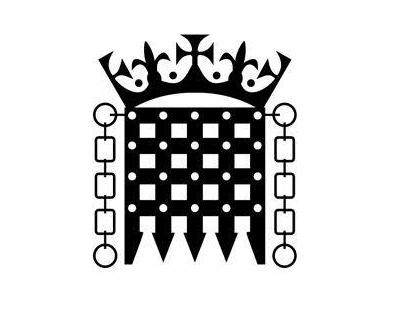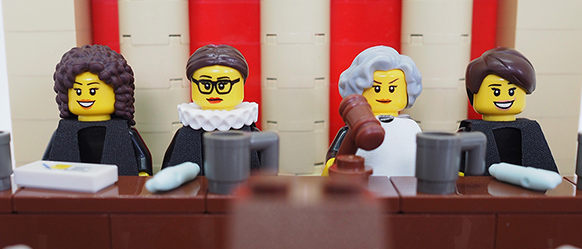Weekly Notes: legal news from ICLR – 13 March 2015
This week’s coach tour of legal news and events from home and abroad includes a critical report on the legal aid cuts, a cornerstone (or plastic brick) that the builders rejected, a wigging from mooters on barristerial headgear, a proposal for a new (or not so new) music award, and a fined example of cultural insensitivity.
This week’s coach tour of legal news and events from home and abroad includes a critical report on the legal aid cuts, a cornerstone (or plastic brick) that the builders rejected, a wigging from mooters on barristerial headgear, a proposal for a new (or not so new) music award, and a fined example of cultural insensitivity.
UPDATED 16 March.
See also (one of our most popular recent posts): Trappists v Spinners: shaping the legal discourse
ApocaLIPs Now
 Justice Select Committee’s damning report on LASPO
Justice Select Committee’s damning report on LASPO
The Government (1) achieved its aim of substantially reducing the civil legal aid budget, but the Justice Committee’s report released earlier this month concludes that it (2) had failed to target legal aid to those who need it most, (3) had not discouraged unnecessary litigation at public expense and (4) could not show it was delivering better overall value for money for the taxpayer. According to the report:
These were the Government’s four objectives for the civil legal aid reforms in the Legal Aid, Sentencing and Punishment of Offenders Act 2012 (LASPO) and this was the conclusion of the House of Commons Justice Committee in its review of the legislation.
In particular,
The Government’s reforms have led to an increase in the number and a change in the profile of litigants in person (LIPs): increasingly these are people who have no choice but to represent themselves, and who may thus have difficulty in doing so effectively: although many tribunals are accustomed to dealing with unrepresented litigants the courts have to expend more resources in order to assist them.
This confirms what many have been saying for the last two years, including judges who find themselves on the front line in dealing with LIPs and making up in expensive court time in front of all the parties, for the advice and case management a legal aid lawyer could have provided at a fraction of the cost in a private consultation. As one judge remarked, the court is not a free advice bureau (DB Family Law, Litigants in Person: Beware).
Moreover, the risk is not just about LIPs costing the system more; without proper advice, they risk losing winnable cases, as both Lord Dyson MR and Sir James Munby P warned last December when speaking to the Select Committee: see Marilyn Stowe blog, Litigants in person are ‘losing cases’
Earlier in the year the Lord Chief Justice, Lord Thomas of Cwmgiedd told the committee much the same thing. There had been a significant rise in the number of LIPs and
‘All my colleagues who do cases with litigants in person say it significantly added to the time [the case takes]. The saving you get by not having lawyers has to be counter-balanced by the increase you have to have in court time.’
Lego J
Toys are us – or are they what we become?

The construction toy company, Lego, has ruled out the proposal (depicted above) of creating a set of female justices of the Supreme Court of the United States. Part of me is relieved at this decision, as they look rather jaundiced, and their coffee mugs and gavel look somewhat oversized, not to mention the inappropriate ruff (left over from Mary Queen of Scotus, perhaps).
According to Maia Weinstock, who creatively toyed with this idea:
This set of custom-designed LEGO minifigures, U.S. Supreme Court replica, and SCOTUS library/study aims to celebrate the accomplishments of women in the legal realm, and to encourage girls and women to work toward high positions in the U.S. judicial system.
However, you can’t actually buy them. According to Maia:
The set was already submitted to LEGO Ideas, but was rejected by the company for going against their “no politics or political symbols” rule.
Huffington Post compares the decision about SCOTUS justices to that taken, rather more positively, when Lego brought out a set entitled The Research Institute which featured three female scientists. Why should science be women’s work, but not law? Time for a petition, methinks.
Incidentally, this is not the first interaction of Lego and law: the construction toy pieces have been used quite creatively to reconstruct famous legal issues on YouTube. See, for example, Lego Law: Palsgraf v. Long Island Railroad, which deals with a famous American torts case (taking some liberties with the actuality, it has to be noted). Also, several short films about actus reus and mens rea by Carol Withey, also on YouTube.
Music: copy gets pasting
Thicke & Williams “got to give it up” (all $7.4m) to Gaye claimants
Songwriter Marvin Gaye once enriched the world with his airs; now the defence of his heritage has enriched his heirs. A Los Angeles jury has found in favour of the late singer’s estate that the R & B stars Robin Thicke and Pharrell Williams, with their hit song Blurred Lines, had plagiarised parts of Gaye’s 1977 hit Got to Give it Up. The jury awarded Gaye’s heirs $4 million in actual damages plus $3.4 million in profits that Thicke and Williams were found to have derived from their copyright infringement. The decision prompted by an application by Thicke & Williams for a declaration of non-infringement, not unusual in relation to patents, a bit less common for music plagiarism, though there must be scope enough in these days of sampling and mashup recycling.
The song Blurred Lines had already caused controversy over its allegedly male chauvinistic video and consent-presumptive lyrics (see Guardian: Blurred Lines: the most controversial song of the decade) and the brouhaha over Miley Cyrus’s twerking at the 2013 MTV video music awards. (Talking of awards, maybe there should be a new one called Music of Gaye Origin (or MoGo). This one should win it.)
For more on the present story:
- Source (without the puns): Reuters Marvin Gaye’s heirs win $7.4 million for ‘Blurred Lines’ plagiarism
- Analysis (via Primary Opinion): Blurred Minds – should musicians give it up or fight for their rights?
- citing Ben, The 1709 Blog, Thicke and Williams crossed that blurred line
- Listen to the songs: Got to give it up (YouTube) and Blurred Lines (YouTube)
Wig interpretation of history
Majority of mooters support barristerial horsehair
A poll conducted on Mootis, the new social medium for lawyers, showed that only 23% of respondents were in favour of ditching the traditional barrister’s wig, although 38% agreed with Baroness Hale (whose remarks inspired the poll) that
“Wigs looked silly when the first woman barrister wore one in 1922, and they look even sillier now.”
31% disagreed with that statement, and another 31% took the trouble to say they were “not bothered one way or the other”.
You can set up your own poll on Mootis, which is also a handy place to find recent news feed posts from the FT, Law Society Gazette and a new account labelled ICLR Latest Cases. (ICLR also has its own account for posting items of interest including some of the items collected herein.)
Human Rights Information Project
New name: RightsInfo
Adam Wagner, barrister of 1 Crown Office Row chambers and key creative of the UK Human Rights blog, has announced a change of name of his new project, to RightsInfo. It’s shorter, snappier, and less of a mouthful. It will be launched on 21 April. Watch this space, or better still the UK Human Rights blog.
International section
Maldives
Former president convicted and sentenced for crimes against judiciary
Former President of the Maldives, Mohamed Nasheed, has been found guilty of terrorism and sentenced to 13 years in prison for the military’s detention of Criminal Court Chief Judge Abdulla Mohamed in January 2012. The present trial judge, Judge Abdulla Didi, said the prosecution’s evidence proved beyond reasonable doubt that Nasheed ordered the chief judge’s arrest or “forceful abduction” and his detention on Girifushi Island, after the Maldives National Defence Force (MNDF) defied orders from the Criminal Court, High Court and Supreme Court to release the judge.
However, there were questions about the fairness of the former president’s trial, according to a report in Minivan News. This includes the following:
Prior to a hearing on March 9, all four of Nasheed’s lawyers quit in protest of the Criminal Court’s refusal to grant sufficient time to examine the prosecution’s evidence and mount a defence.
The presiding judges had denied the lawyers’ request for adequate time, stating the legal team has had the case documents for three years.
Judges also insisted in tonight’s verdict that Nasheed was offered both enough time to prepare his defence and access to lawyers, claiming he refused the opportunity to appoint new lawyers.
At the previous hearing, Judges Didi, Abdul Bari Yousuf, and Shujau Usman dismissed the opposition leader’s repeated requests for legal representation. The judges also refused to hear defence witnesses, claiming they could not negate the prosecution’s evidence or witness testimony.
See also: Nasheed trial “not free or fair,” says Maldivian Democracy Network (MInivan News)
Forum-Asia: Maldives: Trial and Conviction of Former President Nasheed Condemned
Not hearing defence witnesses sounds pretty bad; given that the case involved a complainant who was a member of the judiciary, this bodes even iller. In fact, it begins to look like a textbook breach of both key principles of natural justice: audi alteram partem and nemo judex in causa sua.
On appeal, the defendant might like to refer to this quotation from the judgment of Megarry J in John v Rees [1970] Ch 345, 401, which relates to the first of these:
“As everybody who has anything to do with the law well knows, the path of the law is strewn with examples of open and shut cases which, somehow, were not; of unanswerable charges which, in the event, were completely answered; of inexplicable conduct which was fully explained; of fixed and unalterable determinations that, by discussion, suffered a change.”
India
Rape documentary banned
India has refused to gaze into a mirror which might show the rebarbative ugliness of what appears to be widely accepted male chauvinism and victim-blaming culture. The mirror in question is a documentary entitled India’s Daughter, by British film-maker Leslee Udwin, (whose feature films include East is East and its sequel, West is West, in what was her first documentary) and shown on BBC4 as part of the Storyville series. The Indian government has banned the film “across all media platforms” and even tried unsuccessfully to stop it being broadcast anywhere in the world. Why?
The documentary dealt with story of the brutal gang rape and murder of 23-year-old medical student Jyoti Singh on a moving bus in Delhi in 2012, and the unprecedented protests and riots which this horrific event ignited throughout India.
See, on this blog, Fair Trial or Foul?
See also: India’s daughter: the whole world’s shame (Herald Scotland)
Ian Jack, It’s not Leslee Udwin’s message that India is struggling to accept, it’s the messenger (Guardian)
Banning the film, which includes clips of one of the accused apparently justifying himself on the grounds that the girl was in the wrong place and foolishly resisted, and wouldn’t have died if she’d just let herself be raped, is not going to make these attitudes go away. It fact it has just made the story bigger, and worse, because it confirms the institutional nature of what some critics have dubbed the “rape culture” of India.
There are also questions about the attitude of the defence council (quoted in my earlier piece) who is apparently being investigated by the Bar Council: see The Times, 12 March (£).
See also: Tanvi Misra, I am not India’s Daughter (Atlantic)
Saudi Arabia
Blogger-flogging case “straining” German-Saudi ties
After talks with King Salman in Riyadh, Germany’s Vice Chancellor Sigmar Gabriel has said that the imprisonment and public lashing of blogger Raif Badawi, convicted of “insulting Islam,” is testing bilateral ties, according to DW [Deutsche Welle] (Gabriel: Badawi case strains German-Saudi ties):
Ahead of the meeting, Gabriel had said he would point out to the king that the severity of Badawi’s punishment of 10 years in prison and 1,000 lashes is “unfathomable to us and that it will of course strain bilateral ties.” He added that he also called for the release of Badawi’s lawyer, who has been sentenced to 15 years in prison.
DW added that the Vice Chancellor’s visit to Saudi Arabia also courted headlines because of German arms exports to the region, though it is by no means the only nation doing such deals. However, as our next story indicates, some nations are changing their mind about the sordid trade.
For more on Raif Badawi see Weekly Notes 6 March
Sweden arms deal cancelled over human rights
Sweden has ended a military deal with Saudi Arabia over human rights issues. The trade agreement, which includes the export of military arms to Saudi Arabia, the third largest non-western buyer of Swedish weapons, was said to be worth about 338m kroner or €37m, according to DW (Sweden cancels Saudi arms deal after human rights row)
The announcement of the break-off came after the Swedish Foreign Minister Margot Wallström was allegedly prevented from making a speech at an Arab League meeting, in which she had planned to stress women’s and human rights. A response from Arab ministers claimed that it would have been “incompatible with the fact that the Constitution of the Kingdom of Saudi Arabia is based on Sharia”.
Which is as good as saying that Sharia is incompatible with women’s and human rights. Is that really what they were intending to say (admit)?
Sweden / Ecuador
It’s that man again…
Swedish prosecutors have now offered to come to the Ecuadorian embassy in London to “interview” the fugitive Julian Assange, who sought sanctuary there to avoid being extradited to Sweden by the UK authorities pursuant to Sweden’s request. Assange, who is famous for having founded the official secret-sharing website WikiLeaks, is wanted for questioning over (but has not actually been charged with) alleged sexual offences committed on a previous and presumably voluntary visit to Sweden. Last October the Swedish Court of Appeal, whilst affirming the detention order issued in 2010, criticised prosecutors for not making enough effort to explore “alternative avenues” to interrogate Mr Assange: see Weekly Notes, 21 November 2014.
See also: Weekly Notes 22 August 2014
For more about the latest development (with links to earlier coverage) see BBC, Julian Assange case: Sweden U-turn on questioning
Thailand
Chinese tourist fined for washing feet

Tourists are often criticised for insensitivity to local customs, but if a host country encourages them to spend their money they need to accommodate their customs, too, perhaps. In the case of Northern European berserkers, that means getting stupidly drunk and behaving in ways you wouldn’t think of posting on Facebook if you were sober, and then thinking it hilarious when you are. In the case of Chinese tour groups visiting Thai Buddhist shrines, it may consist of kicking a bronze bell, which is disrespectful, or washing your feet in a public, er, washroom. In a recently reported case, a Chinese tourist was fined 1,000 baht (about £20) in accordance with local regulations, after doing so at Pi Pi Islands National Park, according to Bangkok-based news site Khaosod.
The tourist appears to have been unaware that by washing her feet in a restroom sink, she was doing an act deemed “highly offensive in Thai culture”. Apparently, Thais consider it offensive to put ‘dirty’ feet near a space where people wash their faces.
In 2014, over 4.5 million Chinese tourists visited Thailand. You’d think it might be worth constructing special antiseptic footbaths for them, given the currency they bring in. Or even writing the signs in Chinese. I’m all for criticising those rude, vulgar mainlanders who let their children poop in the street in Hong Kong and their coldfaced rulers who break their treaty undertakings to introduce a measure of democracy in the territory (after the British failed to do so in a century’s colonial rule, let it be noted) but…
If the Thais want the Chinese money, they must put up with their cultural norms as well. I’d rather have them washing their feet than pooping in the street, if I was absolutely forced to choose.
That’s it for now. Enjoy the week ahead, and don’t forget to check out our weekly Case Law Updates. Click here for last week’s alert.
Don’t forget, either, to vote in our 150 Years of Case Law on Trial poll, about to commence its second period, from 1915 to 1945. Jazz age flappers, suffragettes, fascism and communism – it was a period of social and political turbulence, bounded by two world wars. And in the courts, a number of landmark cases which still resonate to this day.
This post was written by Paul Magrath, Head of Product Development and Online Content at ICLR. It does not necessarily represent any views of ICLR as an organisation.